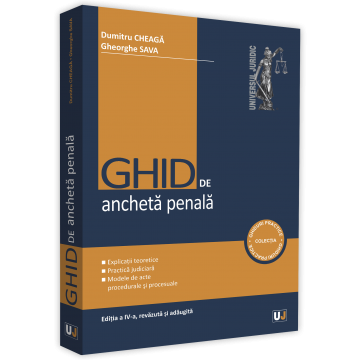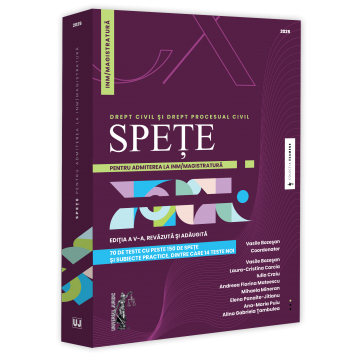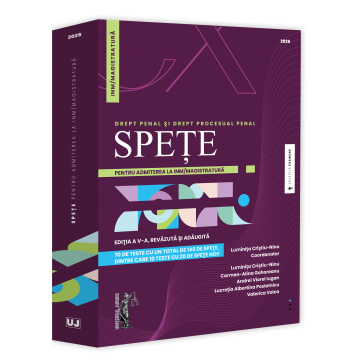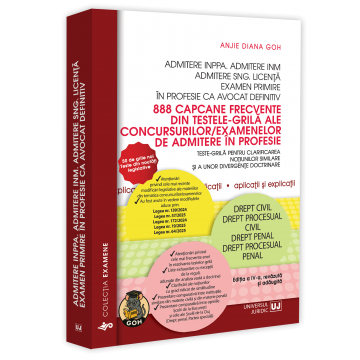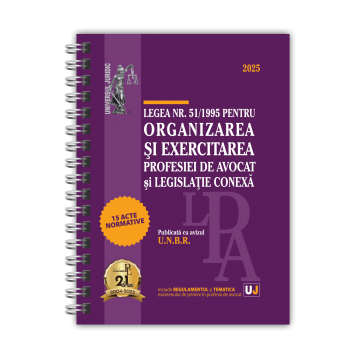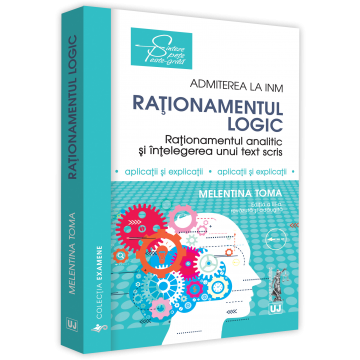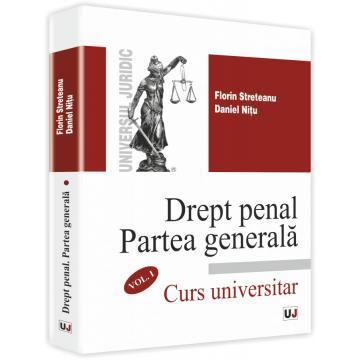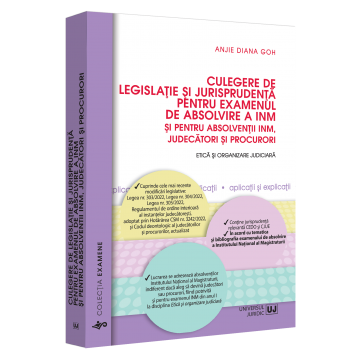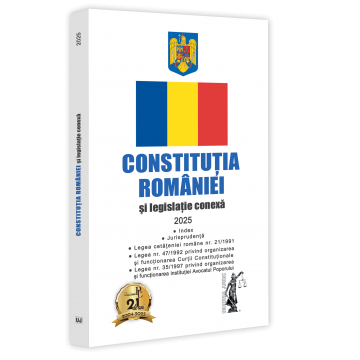ISBN: 978-606-28-0418-3
DOI: 10.5682/9786062804183
Publisher year: 2016
Edition: I
Pages: 344
Publisher: Editura Universitară
Author: Nicolae Voiculescu, Vasile Neagu
- Description
- Download (1)
- Authors
- Content
- More details
- Reviews (0)
The complex conditions existing at international, European and domestic level from the economic-financial point of view registered in recent years, in which the term "crisis" is a consistent leitmotif, have often led to precarious status of workers, especially vulnerable ones, such as young people, women or people with disabilities.
The situation of the Romanian labor market is not different, strongly affected by the non-existence of effective investment strategies and put into practice in order to ensure the necessary jobs, as well as by the massive migration among people at the age of maximum professional maturity.
Those who remain in the country are often forced to accept due to either the fear of losing their job, or the ignorance of their rights under domestic and international legislation, disadvantageous contractual and working conditions.
At the level of the European Union, there is a consensus on the need to adapt the standards, so that they respond as well as possible to the imperatives of worker protection, but also to the optimal functioning of the European single market. Concerns in this regard about the improvement of the directives on working time or posting of workers, or via the debate on the right to collective action at European level, presented, moreover, in this paper, as well as the latest policies, rules, international and European standards, which relate to workers' rights.
Regarding the regulations and directives of the European Union, in the absence of a similar approach in the Romanian and even international legal literature, we analyzed the representative decisions of the Court of Justice of the European Union adopted until the date of printing.
Our stated objective is to increase the level of awareness of the stage reached by international norms, especially European ones, in the issue of worker protection, the fundamental component of the human rights system, as well as the analysis of the compliance of Romanian legislation with them. Also found in the pages of the paper are the most recent significant decisions of the national and European courts that have clarified the content and significance of the normative provisions, for the benefit of the participants in the legal labor relations.
We hope, thus, to contribute to the diminution of a certain state of atony registered in our society, from the legislative level to that of the social partners and even of the workers themselves and to determine them to dialogue and act in their interest, but also of the whole society. .
Therefore, we opted for a presentation style and an accessible language that allows all those interested, regardless of whether they have legal training or not, to understand the structure and purpose of international standards in worker protection and use the information contained, our conviction being that a truly democratic society is one that is based on people who know their rights properly and act in their direction.
Our intention is that all this effort of analysis, synthesis and evaluation of international, European and domestic standards in the field of workers' rights to be a useful tool available to those interested in improving the legislative framework, conduct and mentalities, so that on following them to take advantage of all those engaged in labor relations, and, ultimately, the entire Romanian society, as part of the economic and social space of the European Union.
Authors
-
Protectia drepturilor lucratorilor in dreptul international si european
Download
Dr. Vasile Neagu, is a graduate of the Faculty of Law within the Gheorghe Cristea University of Bucharest and obtained the diploma of Doctor of Law at the Titu Maiorescu University of Bucharest. Currently, he is the General Manager of Telecredit IFN Bucharest.
INTRODUCTION / 7
SUMMARY / 9
TITLE I
STANDARDS / ADOPTED / AT / LEVEL / GLOBAL REGARDING THE PROTECTION OF WORKERS 'RIGHTS / 25
Chapter 1. United Nations Global Compact / 26
Fundamental principles / 27
Principles on workers' rights / 28
Chapter 2. United Nations guidelines on enterprise and human rights / 33
The obligation to protect the human rights of the states / 35
The responsibility of enterprises to respect human rights / 37
Access to remedies / 38
Chapter 3. Tripartite Declaration of Principles on Multinational Enterprises and Social Policy / 43
General characteristics / 43
Content and representative ideas / 44
Chapter 4. Guiding principles for multinational enterprises adopted by the Organization for Economic Co-operation and Development (OECD) / 48
Context of adoption and importance of OECD / 48 principles
Principles on employment and professional relations in multinational enterprises / 51
Chapter 5. International social responsibility and employees' rights / 56
The purpose of adopting the SA Standard 8000/56
The social responsibility requirements provided in SA Standard 8000/57
Chapter 6. Global Reporting Initiative (GRI) / 60
Chapter 7. International Labor Organization and International Labor Code / 62
Historic; fields of activity / 62
Declaration / O.I.M. / on fundamental principles and rights at work / 64
International labor standards / 65
Fundamental human rights / 66
Other areas of regulation of ILO / 76 conventions
TITLE II
WORKERS 'RIGHTS IN EUROPEAN UNION POLICIES AND RULES / 85
Chapter 1. Principles of workers' rights and working conditions in the Treaties of the European Union / 86
Areas of European action / 87
European norms: definition and finality / 89
Subsidiarity and proportionality / 92
The role of social dialogue in the adoption of European norms / 93
Chapter 2. Charter of Fundamental Rights of the European Union / 96
General characteristics / 96
Guaranteed social rights / 97
Community Charter on the Fundamental Social Rights of Workers / 100
Chapter 3. Equal opportunities and non-discrimination / 101
The principle of equal opportunities and equal treatment between men and women in matters of employment and occupation / 102
Equal treatment in professional social security systems / 106
Equal treatment in terms of access to employment, training and promotion and working conditions / 108
Chapter 4. Flexicurity / 113
Definition and conceptual content / 114
Defining principles of flexicurity / 115
The actuality of the flexicurity concept / 116
Chapter 5. Corporate social responsibility (CSR) and workers' rights / 118
Conceptual evolution at the level of the European Union / 118
European Union Strategy on CSR / 120
European Parliament resolutions on CSR / 121
Standardization of corporate social responsibility / 125
TITLE III
EUROPEAN UNION RULES AND JURISDICTION ON WORKERS 'RIGHTS / 129
Chapter 1. Free access to employment and equal treatment / 130
Free movement of workers / 130
Recent rules on equal treatment
The content of equal treatment / 133
Contacting and compensating job offers and requests / 138
Measures to facilitate the exercise of workers' rights in the context of free movement of workers / 141
Normative actions at local level / 144
Chapter 2. Working time and rest time / 145
Fundamental principles of working time organization / 145
Working time: rules and jurisprudence of the CJEU / 148
Rest periods: norms and jurisprudence of the CJEU / 151
Specific provisions regarding night work / 153
Legal regime of derogations and exceptions / 154
Romanian legislation regarding working time and rest time / 157
Chapter 3. Atypical work and very atypical work / 162
The content of the notion of “atypical work” / 162
Part-time work; jurisprudential solutions CJEU / 163
Fixed-term work: European standards and jurisprudence CJEU / 168
Work through a temporary work agent / 177
"Very atypical" forms of work / 185
Chapter 4. Protection of employees in case of employer insolvency / 189
European normative framework regarding the protection of workers in case of employer insolvency / 189
Scope of Directive 2008/94 / EC and definition of insolvency / 190
The content of the obligation to protect workers' claims / 193
Cross-border aspects of the obligation to guarantee employees' receivables / 196
Protection of employees in case of insolvency of the employer in Romanian legislation / 198
Chapter 5. Maintaining workers' rights in case of transfer of the enterprise, unit or parts thereof. 202
European normative framework regarding the maintenance of workers' rights in case of transfer of the enterprise, of the unit or of some parts of them / 202
The content of the obligation to maintain the workers' rights in case of transfer of the enterprise, of the unit or of some parts of them / 205
Protection against illegal dismissals / 208
Obligation to inform and consult and capitalize on rights / 210
Romanian legislation on the protection of workers' rights in case of transfer of the enterprise, unit or parts thereof - critical view / 211
Chapter 6. Posting of workers: European standards and controversial issues / 216
Labor mobility in the European Union - opportunities and risks / 216
Regulation of the posting of workers under European Union law / 217
Derogations from the application of the provisions of Directive 96/71 / EC. Jurisdictional clarifications / 220
Directive 2014/67 / EU on ensuring compliance with the application of Directive 96/71 / EC-control norm / 224
Romanian legislation on the posting of workers in the provision of transnational services - a critical look / 231
Chapter 7. Protection of workers in the situation of collective redundancies 235
European normative framework and representative jurisprudence / 235
Romanian legislation regarding collective redundancies / 240
Chapter 8. Information and consultation of workers / 243
General considerations / 243
Obligation of the employer to inform workers on the conditions applicable to the contract or employment relationship: standards and jurisprudence / 244
Romanian legislation regarding the obligation to inform the person selected for employment or the employee / 248
General framework for informing and consulting workers in the European Union (Directive 2002/14 / EC) / 250
Romanian legislation on the transposition of Directive no. 2002/14 / EC-critical analysis / 253
Information and consultation of workers in undertakings and groups of undertakings with a Community dimension (Directive 2009/38 / EC) / 256
Romanian legislation on the European Works Council / 263
Involvement of workers in European companies (Directive 2001/86 / EC) / 267
Transposition into Romanian law of Directive 2001/86 /. / 270
Chapter 9. Social dialogue. The right to collective bargaining and the right to strike / 273
The right to bargain and to take collective action: standards and jurisprudence. Viking and Laval cases / 273
Proposal for a Regulation on the exercise of the right to bring collective actions (2012) / 275
Interprofessional social dialogue / 281
Chapter 10. Safety and health at work / 285
General considerations / 285
Standards and jurisprudence of the European Union in the field of safety and health of workers at work / 286
Specific directives on safety and security at work / 291
Trends regarding the improvement of the European normative framework in the field of safety and health at work / 306
Harmonized Romanian legislation on occupational safety and health / 309
Chapter 11. Protection of young people at work / 312
Council Directive 94/33 / EC of 22 June 1994 on the protection of young people at work / 312
Norms for the protection of young people at work in the Romanian legislation / 314
CONCLUSIONS / 317
BIBLIOGRAPHY / 322
This paper aims to present the normative, institutional system, as well as the jurisprudence structured at the level of the most prestigious international institutions regarding a continuously topical issue, namely, the protection of workers' rights.
The complex conditions existing at international, European and domestic level from the economic-financial point of view registered in recent years, in which the term "crisis" is a consistent leitmotif, have often led to precarious status of workers, especially vulnerable ones, such as young people, women or people with disabilities. The situation of the Romanian labor market is not different, strongly affected by the non-existence of effective investment strategies and put into practice in order to ensure the necessary jobs, as well as by the massive migration among people at the age of maximum professional maturity.
Those who remain in the country are often forced to accept, due to either the fear of losing their job, or the recognition of their rights under domestic and international legislation, unfavorable contractual and working conditions.
At the level of the European Union, there is a consensus on the need to adapt the standards, so that they respond as well as possible to the imperatives of worker protection, but also to the optimal functioning of the European single market.
Concerns in this regard about the improvement of the directives on working time or posting of workers, or via the debate on the right to collective action at European level, presented, moreover, in this paper, as well as the latest policies, rules, international and European standards, which relate to workers' rights.
Regarding the regulations and directives of the European Union, in the absence of a similar approach in the Romanian and even international legal literature, we analyzed the representative decisions of the Court of Justice of the European Union adopted until the date of sending to print. awareness of the stage reached by international norms, especially European ones, in the issue of worker protection, the fundamental component of the human rights system, as well as the analysis of the degree of compliance of Romanian legislation with them. Also found in the pages of the paper are the most recent significant decisions of the national and European courts that have clarified the content and significance of the normative provisions, for the benefit of the participants in the legal labor relations.
We hope, thus, to contribute to the diminution of a certain state of atony registered in our society, from the legislative level to that of the social partners and even of the workers themselves and to determine them to dialogue and act in their interest, but also of the whole society. . Therefore, we opted for a presentation style and an accessible language that allows all those interested, regardless of whether they have legal training or not, to understand the structure and purpose of international standards in worker protection and use the information contained, our conviction being that a truly democratic society is one that is based on people who know their rights properly and act in their direction.
Our intention is that all this effort of analysis, synthesis and evaluation of international, European and domestic standards in the field of workers' rights to be a useful tool available to those interested in improving the legislative framework, conduct and mentalities, so that on following them to take advantage of all those engaged in labor relations, and, ultimately, the entire Romanian society, as part of the economic and social space of the European Union.
Authors

6359.png)
![Protection of workers' rights in international and European law [1] Protection of workers' rights in international and European law [1]](https://gomagcdn.ro/domains/editurauniversitara.ro/files/product/large/protectia-drepturilor-lucratorilor-in-dreptul-international-si-european-629-976425.jpg)
